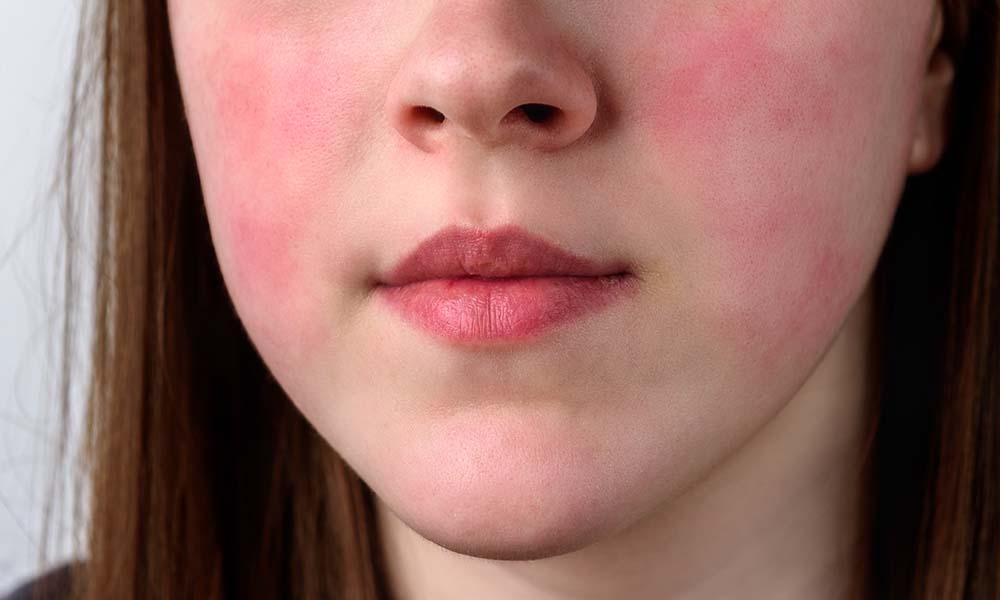Lupus: Symptoms, Causes and Treatment

TABLE OF CONTENTS
Inflammation may be caused by Lupus, a long-term autoimmune disorder that affects the whole body. However, it's not always a systemic problem, since it tends to be a localised one.
When your body's own immune system causes inflammation and cell disintegration, you have an autoimmune illness.
In most cases, the illness is moderate but may become life-threatening if the right treatment isn't given. Treatment for lupus now focuses on relieving symptoms and lowering inflammation, since there is no known cure.
Causes
Organs, tissues, and cells make up the body's immune system. Foreign organisms including viruses, bacteria, fungus and poisons are fought off by the body's natural defences. It also removes defective or dead cells.
In order to keep the body safe, the immune system produces Y-shaped proteins known as antibodies. Antibodies may either neutralise a danger or convey a signal to other cells to eliminate it, depending on the situation. Antibodies are made by B lymphocytes, a subset of specialised white blood cells.
A person's immune system is unable to tell the difference between harmful chemicals, such as antigens, and healthy tissue when they have an autoimmune disease like lupus. In misconception, the body sees itself as an outsider.
As a consequence, the immune system attacks both the healthy tissue and the antigens, resulting in the production of antibodies. Soreness and tissue damage follow and hence it is the cause of lupus.
In persons with autoimmune disorders like lupus, antinuclear antibodies (ANAs) are a prevalent presence. A nucleus-targeting strategy is used in order to achieve these effects. The nucleus is the component of the cell that houses the cell's DNA.
Symptoms
The symptoms of lupus disease are more prevalent during flare-ups of the disease. People with lupus often go through periods of remission between flare-ups, during which they have few or no symptoms.
Lupus is characterised by a broad variety of symptoms, including:
Fatigue
aches and pains in the joints and muscles
sensitivity to sunlight and mouth ulcers while inhaling deeply
issues with memory
butterfly-shaped red marks over the nose and cheeks are a malar rash.
Hair loss that isn't normal
Different individuals are affected by lupus in a variety of ways. Numerous bodily areas may showlupus symptoms.

Females with lupus symptoms
Lupus may manifest itself in a variety of ways, and each person's experience may be unique. Lupus may appear differently in men and women, according to research. Males are more likely to experience more severe symptoms.
Females are more likely to have the following symptoms:
hair thinning
sun sensitivity
mouth ulcers
rashes caused by arthritis
Males with lupus symptoms
Lupus is often thought to affect primarily women, although this is not true. Males may also have lupus, although it is less prevalent. Lupus symptoms are more severe in men, according to research from a reputable source.
Males are more likely to have the following symptoms:
coronary affliction
low haemoglobin level
loss of weight
Injuries to the kidney
chest discomfort
Complications of Lupus
Active lupus patients are often sick all the time. Their symptoms include a high temperature, lack of appetite, and exhaustion. They may also have more specific symptoms if their immune system targets a particular organ or body component. Lupus may affect the following bodily parts:
Skin
Lupus is known to cause skin issues. Lip and tongue sores are also on the list. A variant of lupus known as discoid lupus causes a big, red, circular rash that may get infected. Skin rashes are often aggravated by the sun's rays. Subacute cutaneous lupus erythematosus (SCLE) is a frequent lupus rash that becomes worse when exposed to the sun. Your arms, legs, and chest might all be covered with it. Bullous lupus rash is an uncommon but dangerous lupus rash that is characterised by enormous blisters.
Joints
People with lupus often suffer from joint pain and inflammation. It may induce swelling, but it can also cause discomfort. Morning stiffness and soreness are possible. For a few days or weeks, arthritis might be a concern, but it can also be a long-term issue. It's typically not too bad.
Kidneys
Approximately half of the persons with lupus suffer from renal disease. They pose a threat. Lupus symptoms, such as tiredness, arthritis, rash, fever, and weight loss, increase the risk of these complications. But they may also occur when there are no other signs or symptoms to indicate a problem.
Blood
Low levels of red blood cells, white blood cells, or platelets are common in lupus patients (particles that help your blood clot).
Treatment for Lupus
Your lupus therapy for lupus treatment will be based on a number of factors, including your age, general health, medical history, the portion of your body that is affected, and the severity of your illness.
Regular medical appointments, such as those with a rheumatologist, are essential for people with lupus since the condition might vary over time.
Some minor instances don't need treatment. More severe symptoms like renal disease may need stronger drugs. Lupus medications include
Theodore (belimumab)
Because it is a biologic, this medication is a close match to naturally occurring proteins. By targeting a protein that may be linked to lupus, it impairs your immune system.
Cyclotoxan (cyclophosphamide)
Your immune system is also weakened by this chemotherapy treatment. Lupus that affects the kidneys or the brain may be treated with this medication. Lupus sufferers may benefit from this treatment. In the beginning, it was used to prevent organ rejection after a transplant
Rheumatrex
Rheumatrex is an anti-rheumatic drug (methotrexate). One more chemotherapy medication that impairs the immune system. Dermatological diseases including psoriasis and rheumatoid arthritis may be treated with modest dosages of prednisone and hydroxychloroquine.
Rituxan (rituximab)
A lymphoma and rheumatoid arthritis biologic treatment. If your symptoms are severe and not responding to previous therapies, you may want to consider using this medication.
Steroids
Steroid creams may be used directly on rashes. They're generally safe and effective, particularly for minor rashes. Lupus symptoms may be alleviated to a degree by using low dosages of steroid creams and tablets. Lupus may cause internal organ damage; therefore, you may need to take steroids in larger amounts. High dosages, on the other hand, are more likely to result in negative reactions.
Conclusion
Lupus might have a negative impact on your health, but it doesn't have to detract from your overall well-being. You may have the healthiest possible life by paying attention to your medicines and overall well-being.
In certain cases, dealing with a lupus diagnosis might be difficult. Sharing your story with others, whether in person or online, may be therapeutic.






